2016 年山东青岛大学基础英语考研真题
Part I. Cloze (20 points)
Directions: There are 20 blanks in the following passage. For each blank there are
four choices marked A, B, C and D. You must choose the ONE that best fits into the
passage.
Promptness is important in American business, academic, and social settings. The
1 of punctuality is taught to young children in school. The use of bells 2 to the
child that punctuality and time itself are to be 3 .
People who 4 appointments are considered 5 . If people arelate to job interviews,
appointments or classes, they are often 6 as unreliable and irresponsible. In the
business world, “time is money” and companies may fine their 7 for being late to
business meetings. Of course, it is not 8 possible to be punctual. Social and business
etiquette also provide 9 for late arrivals. Calling on the telephone if one is going
to be more than a few minutes late for 10 appointments is considered polite and is
often expected. Keeping a friend waiting 11 ten to twenty minutes is considered rude.
On the 12 hand, arriving thirty minutes late to some parties is 13 .Respecting
deadlines is also important in academic and professional 14 . It is expected that
deadlines for class 15 or business reports will be met. Students who hand 16
assignments late may be 17 to
find that the professor will lower their 18 or even refuse to grade their work. 19
it is a question of arriving on time or of meeting a deadline, people are culturally
20 to regulate time.
1. A) sense B) importance C) influence D) meaning
2. A) symbolize B) signal C) sign D) reflect
3. A) awed B) loved C) respected D) devoted
4. A) do B) leave C) make D) keep
5. A) dependable B) independent C) dependent D) undependable
6. A) watched B) observed C) looked D) viewed
7. A) executives B) leaders C) chiefs D) presidents
8. A) often B) frequently C) always D) usually
9. A) rules B) theories C) orders D) laws
10. A) programmed B) planned C) scheduled D) projected
11. A) past B) more C) beyond D) about
12. A) another B) other C) each D) one
13. A) acceptable B) available C) accessible D) adaptable
14. A) circles B) grounds C) fields D) rounds
15. A) works B) duties C) assignments D) responsibilities
16. A) out B) over C) from D) in
17. A) astonished B) surprised C) astounded D) amazed
18. A) figures B) levels C) numbers D) grades
19. A) How B) When C) Where D) Whether
�
20. A) restricted B) conditioned C) surrounded D) termed
Part II. Reading Comprehension (40 points)
Directions: There are four passages in this part. Each passage is followed by some
questions. For each of them there are four choices marked A, B, C and D. Choose the
one that you think is the best answer.
Passage One
What is there to write about in today’s column, other than the barbaric attacks
of those heartless terrorists that took place 11 years ago today?
Thousands of people in New Jersey, NYC and the District of Columbia started their
morning on that day in their usual manner, but since then things have never been
the same, for them and for the rest of the world. In cold blood, fewer than 20 men
rocked the boat globally through their unjustifiable, despicable(卑劣的)and
treacherous(奸诈的)actions. Many innocent lives perished during these attacks.
Every anniversary of this tragic day, I make a habit to set aside a substantial amount
of time for myself and pray. My immediate prayers always go for the victims of these
brutal attacks. I pray for those who died, and I pray even harder for their loved
ones. I try to empathize(神会)with the pain and grief they must have felt on that
day and since then. I can only imagine the terror in the hearts and minds of those
people who heard the news of the attacks and desperately tried to contact their loved
ones in Manhattan and
Washington D.C. In the early hours of that horrific day, I can only imagine the pain
of those who in panic were waiting to hear from a spouse, father, mother, son,
daughter, relative or a friend who will never come home. I can picture the flowing
tears of those who finally received the heart-wrenching news of their loved ones
but can only imagine their state of mind, how their thoughts sunk into deep sorrow.
As I pray, I wonder: what do these people do every September 11? How do they hold
it together? I bring up these wounded souls in my thoughts and prayers and pray for
strength, recovery and healing for them.
I pray that as a nation we will never fall short to hold these people and support
them in any way that we can, as we remember them in our thoughts and prayers. I pray
that their stories will not be stolen from them. I hope and pray that we will not
pour salt into their bleeding wounds, abusing their memories by using them to score
political points and/or to advance our own agenda. Many immediate relatives of the
victims told me personally that seeing 9/11 misused to justify all sorts of
non-worthy and cheap things deeply hurt them and increased their pain.
21. The phrase “rock the boat” in the sentence “in cold blood, fewer than 20 men
rocked the boat globally through their unjustifiable, despicable and treacherous
actions” (Paragraph 1) means __________.
A) to spoil the good or comfortable situation
B) to get into difficulties
C) to face the same dangers
D) to make a special effort
22. Which sentence best expresses the main idea of this passage?
A) The writer looks back on how people’s work and their lives were changed after
�
those reprehensible attacks 11 years ago.
B) The writer sets aside time to pray every September 11.
C) The writer calls on people to fight against terrorism.
D) The writer recalls how people survived during those attacks.
23. The phrase “fall short” in “I pray that as a nation we will never fall short
to hold these people and support them in any way that we can, as we remember them
in our thoughts and prayers” (Paragraph 3) is closest in meaning to __________.
A) succeed
B) manage
C) resolve
D) fail
24. Why does the writer “pray that their stories will not be stolen from them”
(Paragraph 3)?
A) Because they are not allowed to tell their stories
B) Because their stories are used to score political points.
C) Because their stories are not paid for.
D) Because their stories are sold cheap.
25. Which of the following can be the most suitable title for the passage?
A) Personal Reflections on September 11: A Year Later
B) September 11: Perspectives from the Field of Charity
C) September 11: Ten Years
D) Prayerful Reflections on September 11
Passage Two
Most hungry people live in countries that have food surpluses rather than deficits.
According to the UN Food and Agriculture Organization (FAO), we are already producing
one and a half times the amount of food needed to provide everyone in the world with
an adequate and nutritious diet, yet one in seven people is suffering from hunger.
Rather than growing food to meet the needs of local communities for a healthy, diverse
diet, industrial agriculture produces crops to sell on world markets. While world
crop production has tripled since the 1950s, more people go hungry now than 20 years
ago. Small family farmers are driven off their land and local people cannot afford
to buy what is grown. Too often, the result is a downward spiral of environmental
destruction, poverty and hunger.
Food security will not be achieved by technical fixes, like genetic engineering (GE).
People who need to eat need access to land on which to grow food or money with which
to buy food. Technological “solutions” like GE mask the real social, political,
economic and environmental problems responsible for hunger.
The case of Argentina, the number two producer of GE crops in the world and the only
developing country growing GE food crops on a large commercial scale, shows that
GE does not lead to an increase in food security.
Millions of tons of GE soya are exported every year from Argentina for cattle feed,
while millions of Argentineans go hungry.
Hunger and malnutrition are a direct result of a lack of access to, or exclusion
from, productive resources, such as land, the forests, the seas, water, seeds,
�
technology and credit. Seventy-five percent of the world’s hungry people are
politically marginalized ones who live in rural areas. An example of the grossly
unequal distribution of land that directly contributes to hunger: in
Latin America, 80 percent of agricultural land is in the hands of 20 percent of the
farmers; the other 20 percent of the land is in the hands of the remaining
80 percent.
The current agricultural trade regime puts the South in an impossible situation.
The Organization for Economic Co-operation and Development (OECD) annual state
subsidies of their national agricultural sectors exceed Sub-Saharan Africa’s entire
Gross Domestic Product. Subsidized exports, artificially low prices and WTO
legalized dumping by the rich countries characterize the current unfair model of
agricultural trade faced by poor countries.
Research often neglects the development of agricultural techniques that reduce the
inputs needed and that are easy to control. Agricultural research at international
and national levels is highly orientated towards industrialagriculture.
GE crops have delivered record agricultural exports but the environmental and social
price is both unacceptable and unsustainable. Livelihoods have been destroyed,
hunger has increased and the environment is being badly damaged.
26. __________ gives rise to hunger in most circumstances.
A) Inadequate food production
B) Insufficient farming land
C) Little access to resources
D) Innutritious diet
27. Which of the following is TRUE about GE crops?
A) GE crops can solve the problem of hunger.
B) The production of GE crops enables more Argentineans to live a better life.
C) GE crops have been proven to be environmentally friendly.
D) Technology involved in GE crops fails to solve the problems
responsible for hunger.
28. The word “regime” in “agricultural trade regime” (Paragraph 6) probably
means __________.
A) system
B) sector
C) model
D) finance
29. Which of the following is NOT a characteristic of the current model of
agricultural trade faced by poor countries?
A) Subsidized exports.
B) Low price of their produce.
C) Large-scaled growing of GE crops.
D) Dumping by rich countries.
30. Which of the following is NOT true?
A) Industrial agriculture has driven small family farmers off their land.
B) With the development of agricultural techniques, fewer people go
�
hungry now than 20 years ago.
C) Underprivileged rural people account for three quarters of those who suffer from
hunger around the world.
D) The WTO unfairly put poor countries at a disadvantage.
Passage Three
Efforts to educate people about the risks of substance abuse seem to deter some people
from using dangerous substances, if such efforts are realistic about what is
genuinely dangerous and what is not. Observed declines in the use of such drugs as
LSD, PCP, and Quaaludes since the early 1970s are probably related to increased
awareness of the risks of their use, and some of this awareness was the result of
warnings about these drugs in “underground” papers read by drug users. Such sources
are influential, because they do not give a simple “all drugs are terrible for you”
message. Drug users know there are big variations in danger among drugs and anti-drug
education that ignores or denies this is likely to be ridiculed. This is illustrated
by the popularity among young marijuana users of Reefer Madness, a widely unrealistic
propaganda film against marijuana made in the 1930s. This film made the rounds of
college campuses in the 1970s and joined rock-music videos oncable television’s
MTV in the l980s. Instead of deterring marijuana, it became a cult film among users,
many of whom got high to watch it.
Although persuasion can work for some people if it is balanced and reasonable, other
people seem immune to the most reasoned educational efforts. Millions have started
smoking even though the considerable health risks of smoking have been well known
and publicized for years. Moreover, the usefulness of education lies in primary
prevention: prevention of abuse among those who presently have no problem. Hence,
Bomier’s (1978) contention that “if the Pepsi generation can be persuaded to drink
pop wine, they can be persuaded not to drink it while driving”is probably not correct,
since most drunken driving is done by people who already have significant drinking
problems, and hence seem not to be dissuaded even by much stronger measures such
as loss of a driver’s license.
31. According to the passage, up to now, anti-drug education ___________.
A. has made all people see the danger of drugs
B. has succeeded in dissuading people from using drugs
C. has been effective only to a certain degree
D. has proved to be a total failure
32. The film Reefer Madness mentioned in the passage ___________.
A. effectively deterred marijuana use
B. was rejected by young marijuana users
C. did not picture the danger of marijuana realistically
D. was welcomed by marijuana users because it told them how to get high
33. The message “ all drugs are terrible for you ” is not influential
because___________.
A. it ignores the fact that drugs vary greatly in danger
B. it gives a false account of the risks of drag use
C. some drugs are good for health
�
D. it does not appear in underground papers
34. According to the passage, which of the following statements is NOT true?
A. Even balanced and reasonable anti-drug persuasion is influential only to some
people.
B. Most drug users are ignorant of the danger of drugs.
C. Punishments such as loss of a driver’s license do not seem to be an effective
way to stop drunken driving.
D. Primary prevention is a useful principle to be followed in anti-drug education.
35. The best title for the passage would be ___________.
A. Are All Drugs Terrible for You?
B. Do People Believe What Underground Papers Say?
C. Is There an Increased Awareness of the Risks of Drugs?
D. Can Persuasion Reduce Drug Abuse?
Passage Four
Sociology is defined as the study of human groups. In the broadest sense, sociology
is concerned with understanding patterns of human relationships, their causes and
their effects. Unlike psychology, sociology does not attempt to explain the behavior
of a particular individual under certain circumstances.
Rather, sociology focuses on social trends or other influences that affect whole
groups or categories of people. Thus, while a psychologist might counsel an
individual who feels worthless after retiring from a long and successful career,
a sociologist would be more likely to examine societal attitudes that may contribute
to the loss of self-esteem experienced by many retired people in our society.
The emphasis that sociology places on human groups rather than individuals stems
directly from the work of Emile Durkheim, a pioneering sociologist of the nineteenth
century. Durkheim likened the nature of a social group to bronze, a unique metal
that is formed when the metals tin, copper, and lead are melted and mixed together.
Durkheim noted that bronze is much harder than any of its component metals. In the
same way, he reasoned, the characteristics of a social group viewed as a whole cannot
be determined simply by examining the characteristics of its individual members.
Nor can individuals be understood strictly in terms of the individuals themselves;
when people come together as members of a particular group, the group exerts
considerable pressure on the individual to conform to what it considers acceptable
ways of thinking, feeling, and behaving.
Besides developing a theoretical foundation for the study of social groups, Durkheim
also conducted research designed to corroborate his theoreticalwork. Using landmark
research methods, Durkheim collected and analyzed data from a number of countries
that kept records on suicides. He wanted to show that social environment may have
a profound effect even on those
behaviors we consider most personal. The results of his study showed that suicide
rates do indeed vary according to specific social characteristics. For example,
Durkheim found that members of religions with strong prohibitions against suicide
are less likely to commit suicide than are members of religious groups with weaker
prohibitions. He also found a lower incidence of suicide among married persons than
�
among persons who were single or divorced.
Taken together, the findings of Durkheim’ s study provided convincing evidence that
social groups do indeed exert pressures that control or regulate the behavior of
individuals, including deeply personal behaviors.
Durkheim’s rigorous research methods captured the attention of sociologists around
the world, and were perhaps even more important to the future development of
sociology than any specific research results could be.
Within a short time, his specific approach to formulating and testing social theory
became a model that guided the work of nearly all sociologists. This assured Emile
Durkheim a lasting place as one of the key figures in the history of sociology.
36. Which of the following best expresses the main idea of the selection?
A. Both the social group theory and the scientific research methods developed by
Durkheim have contributed much to the field of sociology.
B. Durkheim believed that individual members of a group strongly influence the group’
s ways of thinking, feeling, and behaving.
C. The research study conducted by Durkheim provided strong evidence that suicide
rates vary among members of different social groups.
D. Through his research, Durkheim made great strides in distinguishing sociology
from psychology.
37. The writer’s main purpose in writing this text is to ______________.
A. outline the steps Durkheim followed in conducting his research study
B. describe the ways in which Durkheim’s work has influenced sociology
C. persuade the reader that social groups control most of the behaviors of their
individual members
D. explain the differences between sociology and psychology
38. According to the text, how do sociologists and psychologists differ?
A. Sociologists are more concerned with explaining behavior than arepsychologists.
B. Psychologists focus more on individuals than do sociologists.
C. Sociologists spend more time helping people solve their problems than do
psychologists.
D. Psychologists are more interested in understanding patterns of human
relationships than are sociologists.
39. In comparing social groups to bronze, Durkheim wished to illustrate the idea
that _____________.
A. a social group has characteristics that differ from those of its individual
members
B. social groups are made up of three major component parts acting together
C. each social group is a unique entity that is unlike any other social group
D. social groups are extremely difficult to break apart once they have been formed
40. Which of the following best defines the word “model” as it is used in the last
paragraph of the text?
A. one of two or more alternative styles
B. an artist’s subject
C. a small copy of an object
�
D. a plan to be imitated
Part III. Translation (40 points)
(1)Translate the following from English into Chinese (20 points)
For the Boston Marathon is American’s oldest annual long-distance race and the most
famous. Many amateur events attract star athletes only by offering to pay all their
expenses. But the Marathon grows in appeal from year to year even though it charges
each runner $2 to enter and gives the winner only a laurel wreath and gold medal.
To the 34 runners finishing next go small cups or bronze medals. And all those who
run the course in under 4 hours receive a certificate telling their time and place
at the finish. The others in the field get a free bowl; of beef stew afterwards and
a doctor to treat their egg-size blisters.
The Marathon is run each April on Patriots’ Day, a state holiday bright with parades
and costumes. It draws one of the largest crowds to see any athletic event, some
250,000 people. Runners from all over the United States enter the race, eager to
match steps with the world’s greatest distance runners.
The physical challenge is like that of an unconquered mountain. Even the disabled
sometimes cannot resist competing ---- unofficially.
(2)Translate the following from Chinese into English (20 points)
英国图书馆已耗资 5 亿多英镑将其收藏品存放到一栋新建的大楼里。现在该图书馆计划把
它的全部收藏放到互联网上。从 18 世纪中叶到现在,英国图书馆收集了 1.5 亿件的各种
资料和藏品,一旦上网,将是互联网上最大的一家信息资源库。按照已经出台的几项提议,
英国图书馆将重塑自我,成为一个面向全球大挣其钱的图书馆。它现在每年得到政府拨款为
8000 多万英镑。新建藏品楼超出了预算,因而受到英国遗产
部前部长戴维麦勒的批评。他认为未来十几年里,英国的文化艺术事业将会因此而深受其苦。
约翰阿思浯斯博士是英国图书馆懂事会的主席。他已请求政府批准图书馆成立一个从事商业
性经营的部门。他说,“图书馆在未来将起到的作用,就如同工业革命时期油井和煤矿所起
的作用一样重要。“网络世界不是过眼烟云,我们不得不重新考虑从前经营图书馆的方式。
网络革命目前还处于起步阶段,而我们尽管潜力巨大,却因种种限制而不能投入这场革命。”
Part IV. Writing (50 points)
Nobody is living alone in society. People are living in a team to learn where they
interact with each other in one way or another to serve their own interests,or the
interests of their teams, or both. People need team spirit in such circumstances.
What is team spirit? Write an essay of about 400 words to state your view
�
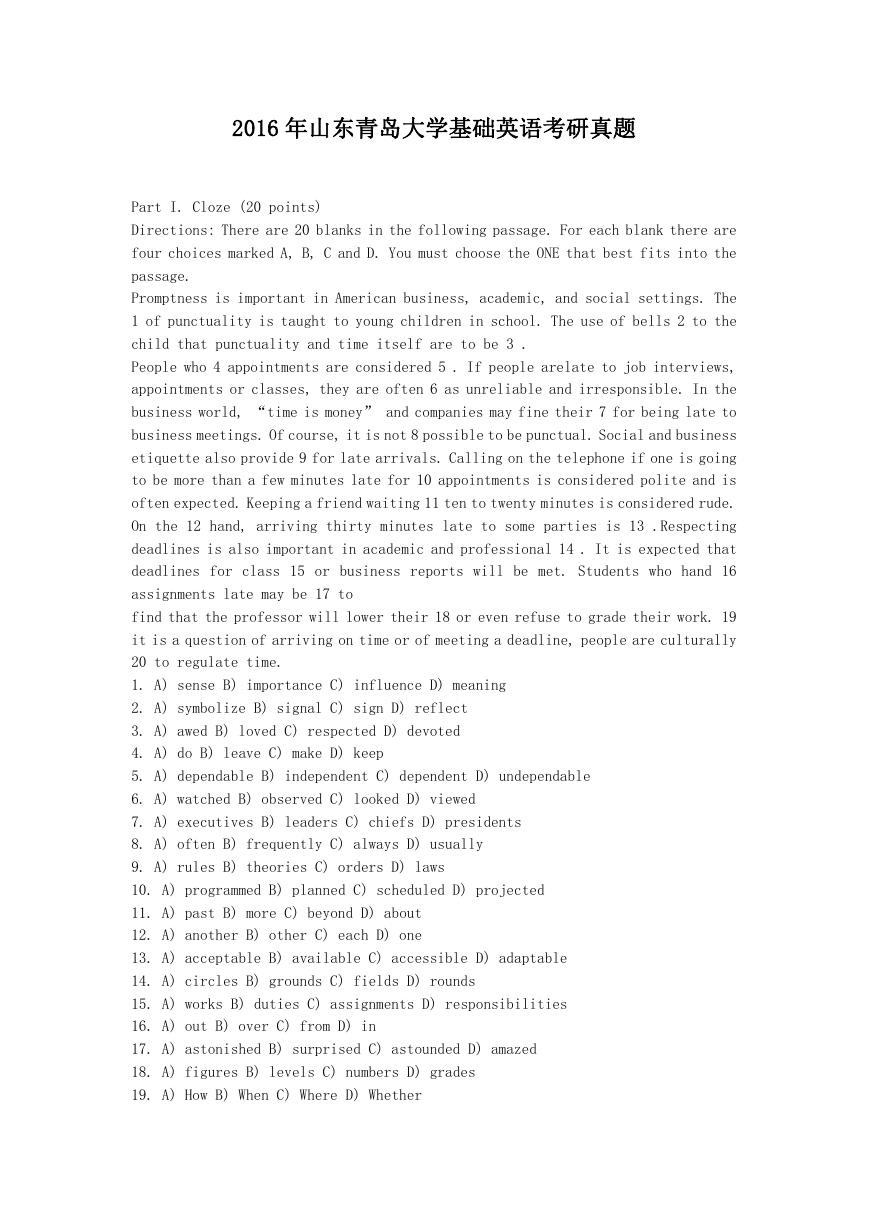
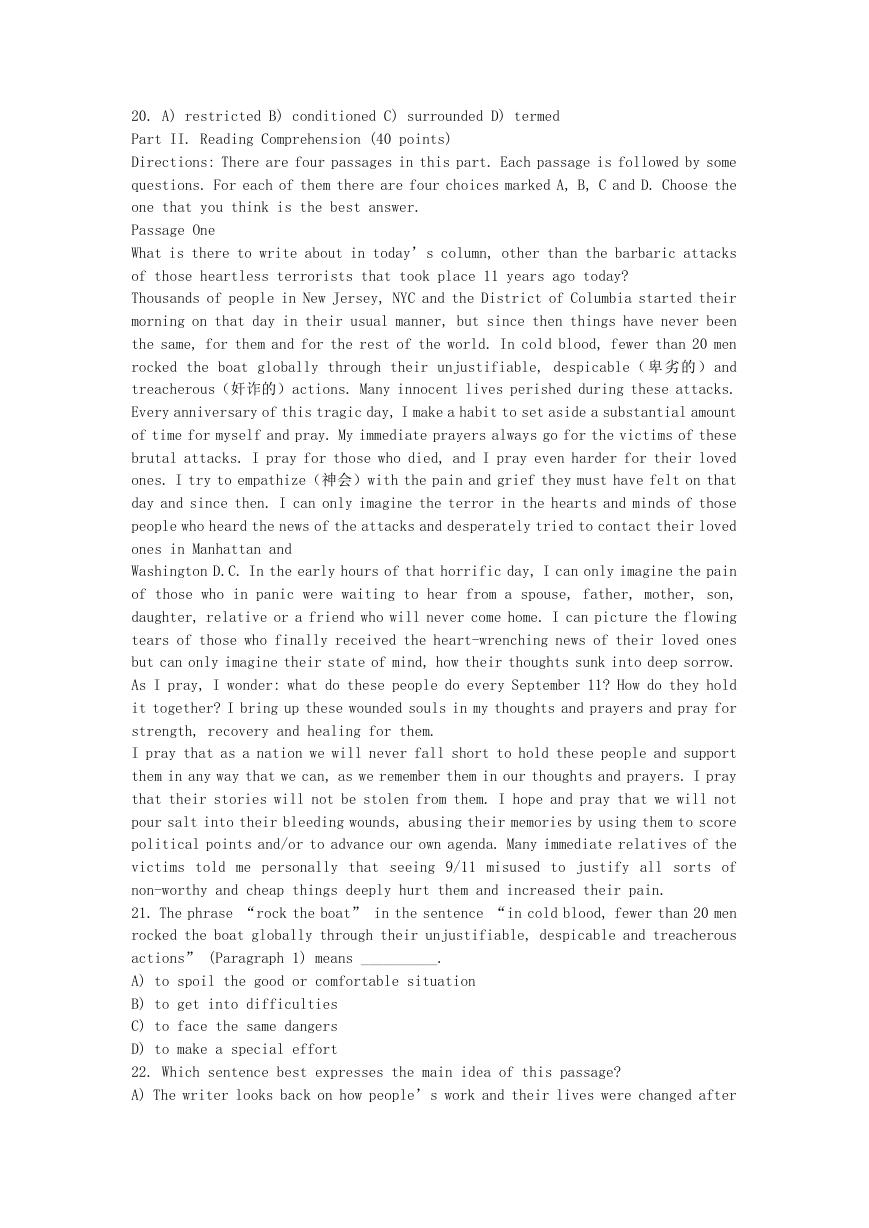
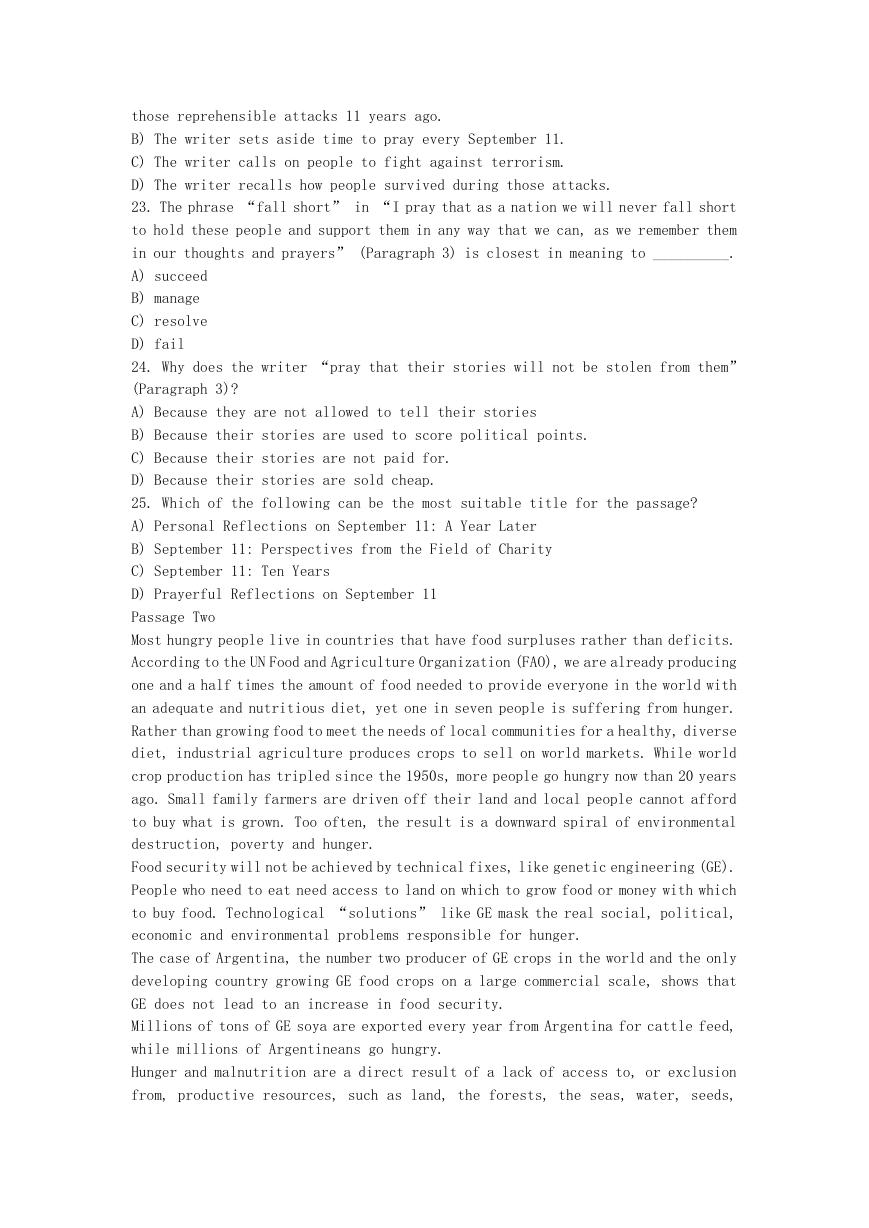
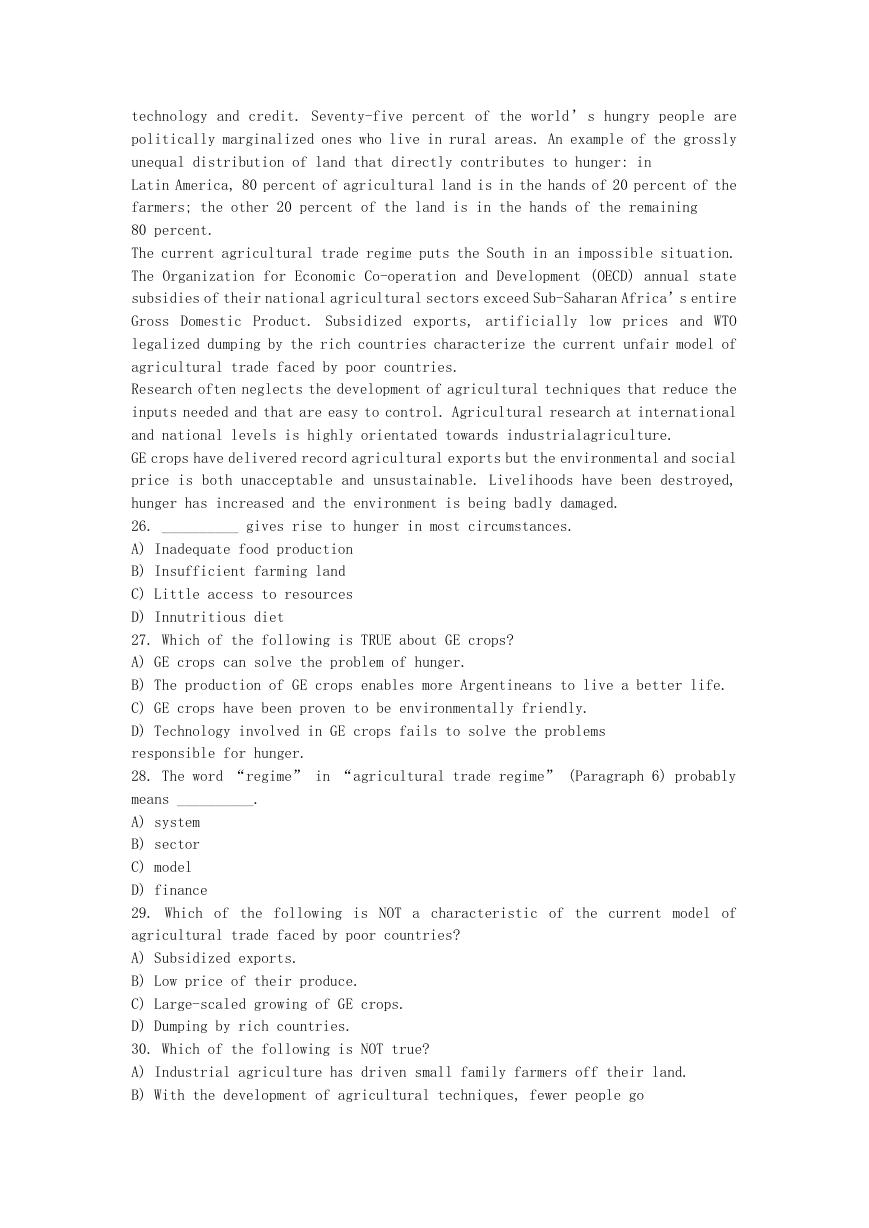
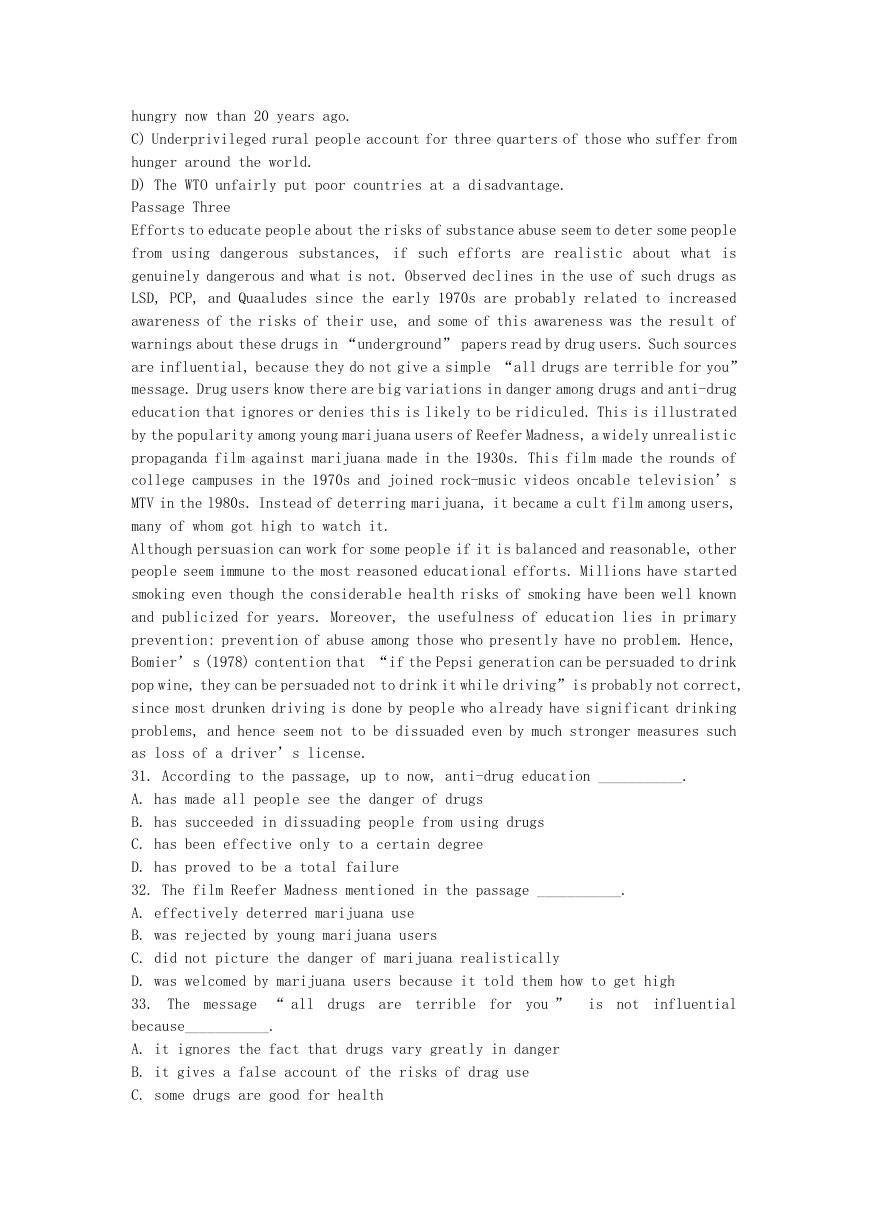
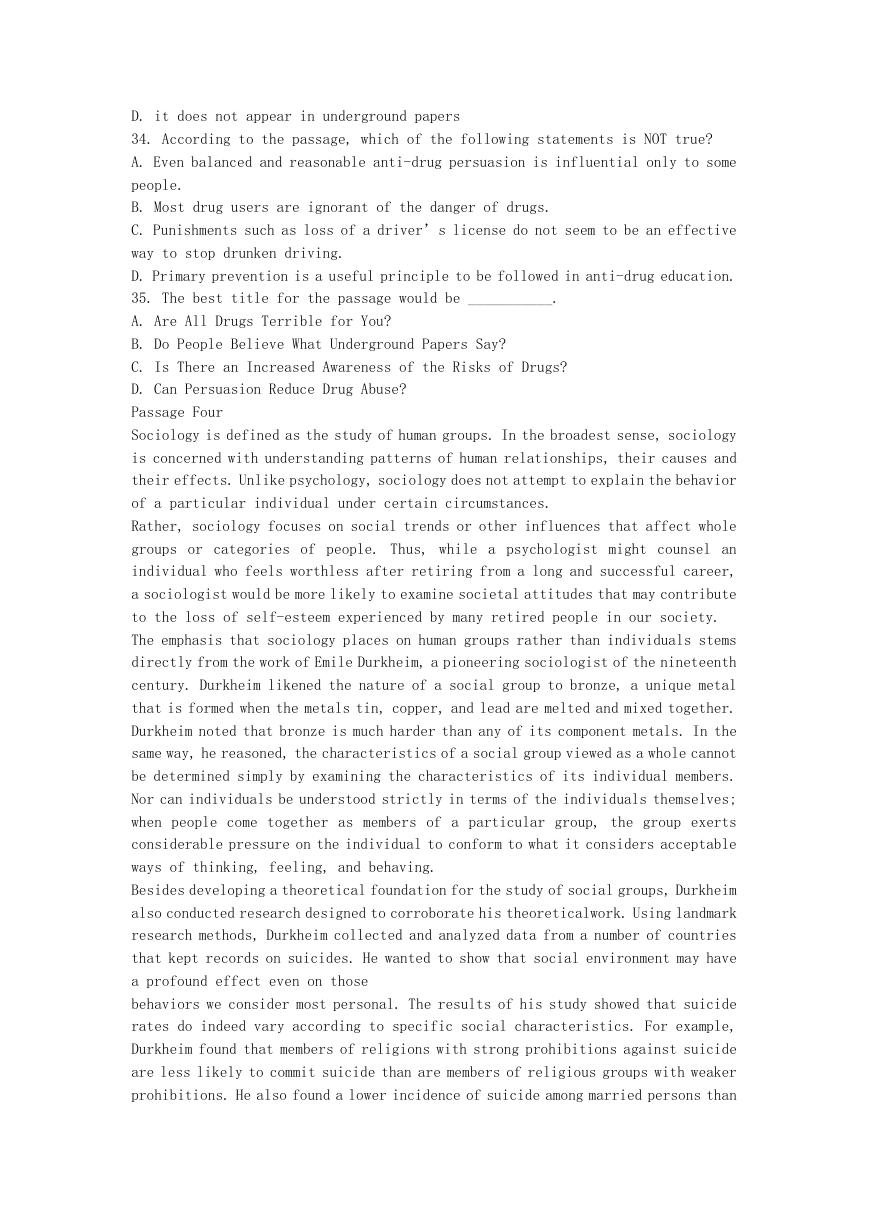
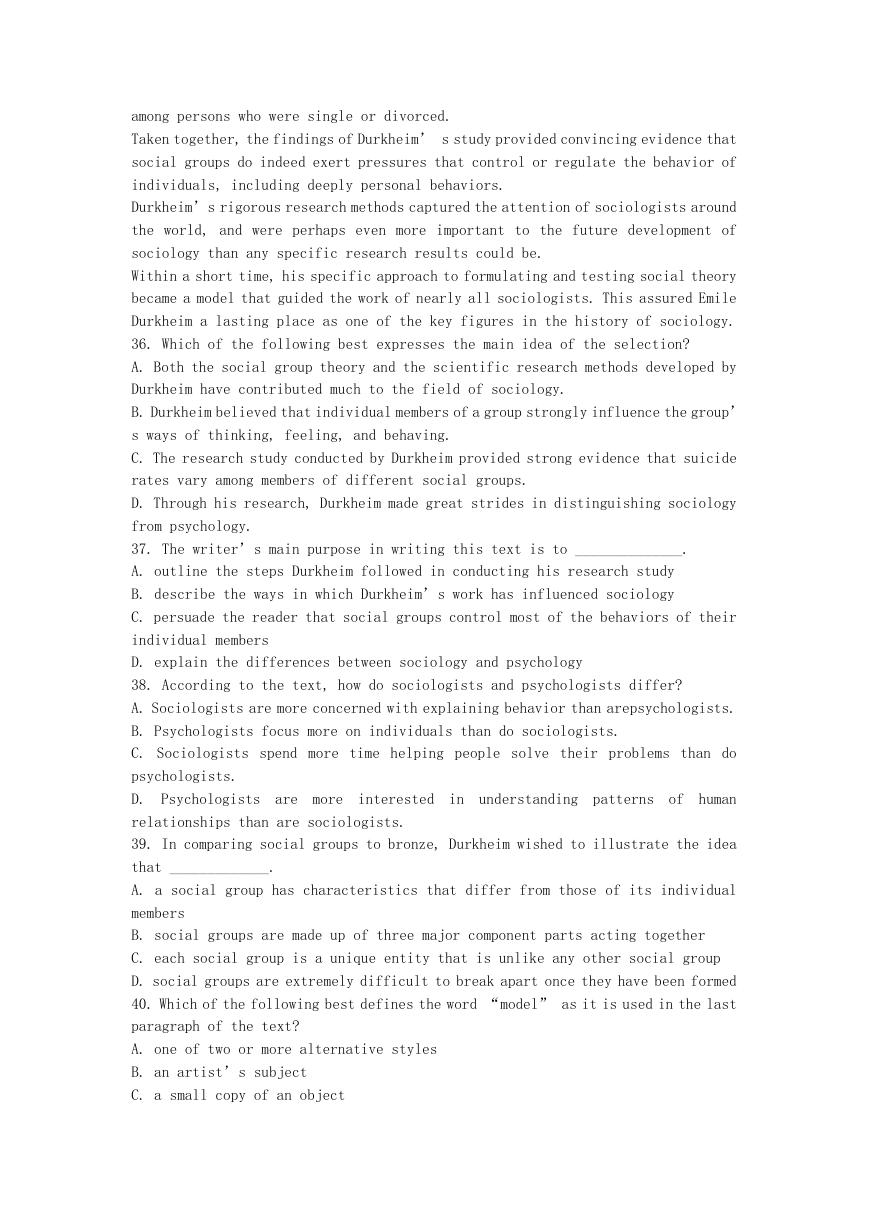
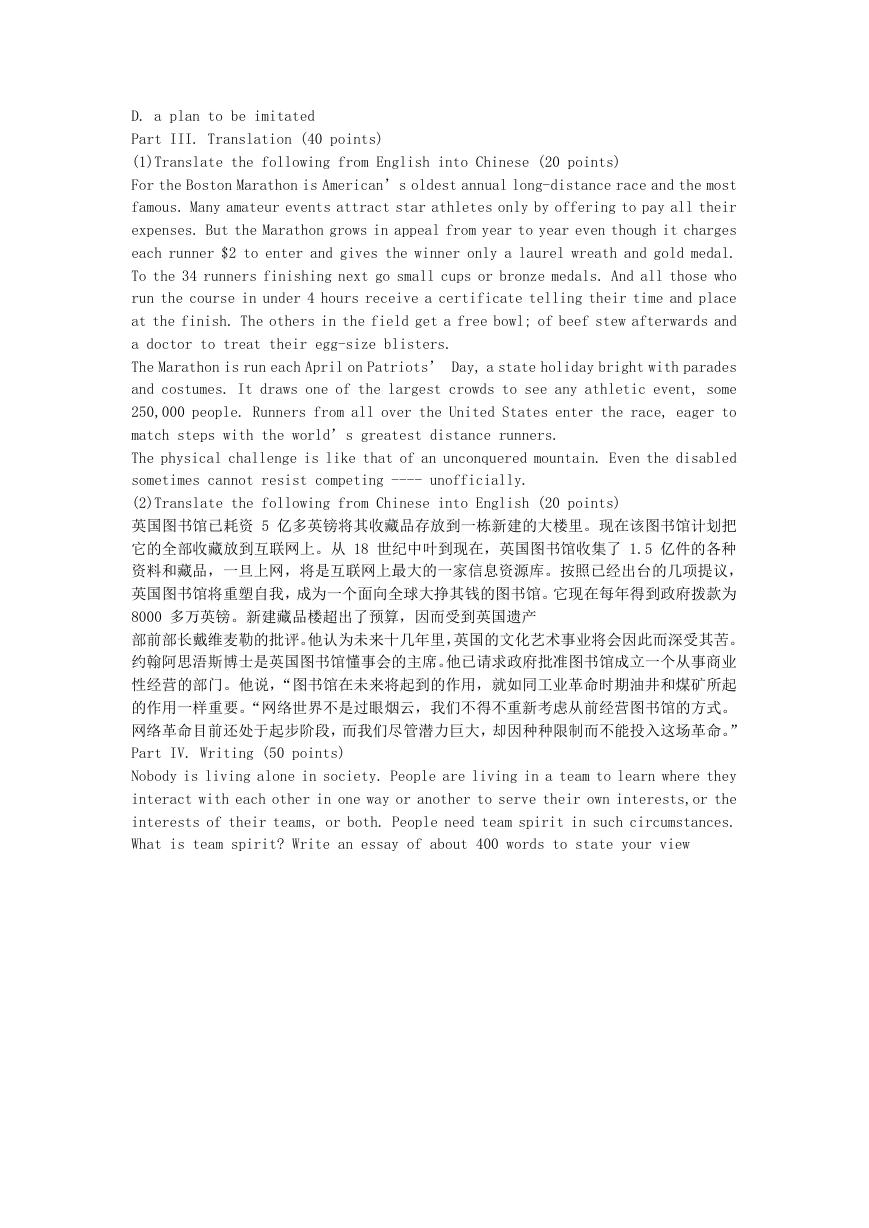








 2023年江西萍乡中考道德与法治真题及答案.doc
2023年江西萍乡中考道德与法治真题及答案.doc 2012年重庆南川中考生物真题及答案.doc
2012年重庆南川中考生物真题及答案.doc 2013年江西师范大学地理学综合及文艺理论基础考研真题.doc
2013年江西师范大学地理学综合及文艺理论基础考研真题.doc 2020年四川甘孜小升初语文真题及答案I卷.doc
2020年四川甘孜小升初语文真题及答案I卷.doc 2020年注册岩土工程师专业基础考试真题及答案.doc
2020年注册岩土工程师专业基础考试真题及答案.doc 2023-2024学年福建省厦门市九年级上学期数学月考试题及答案.doc
2023-2024学年福建省厦门市九年级上学期数学月考试题及答案.doc 2021-2022学年辽宁省沈阳市大东区九年级上学期语文期末试题及答案.doc
2021-2022学年辽宁省沈阳市大东区九年级上学期语文期末试题及答案.doc 2022-2023学年北京东城区初三第一学期物理期末试卷及答案.doc
2022-2023学年北京东城区初三第一学期物理期末试卷及答案.doc 2018上半年江西教师资格初中地理学科知识与教学能力真题及答案.doc
2018上半年江西教师资格初中地理学科知识与教学能力真题及答案.doc 2012年河北国家公务员申论考试真题及答案-省级.doc
2012年河北国家公务员申论考试真题及答案-省级.doc 2020-2021学年江苏省扬州市江都区邵樊片九年级上学期数学第一次质量检测试题及答案.doc
2020-2021学年江苏省扬州市江都区邵樊片九年级上学期数学第一次质量检测试题及答案.doc 2022下半年黑龙江教师资格证中学综合素质真题及答案.doc
2022下半年黑龙江教师资格证中学综合素质真题及答案.doc